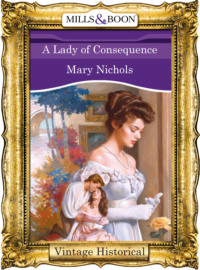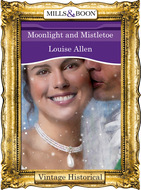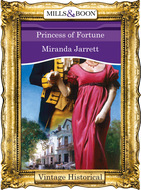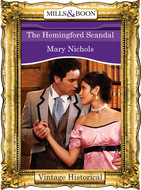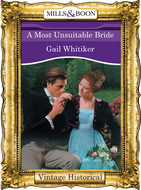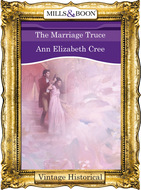Kitap dosya olarak indirilemez ancak uygulamamız üzerinden veya online olarak web sitemizden okunabilir.
Kitabı oku: «A Lady of Consequence», sayfa 4
‘If it is true, then it is very sad.’ She paused. ‘But do be careful, Duncan, you do not raise hopes in her that can never be fulfilled.’
He laughed a little harshly. ‘Oh, Mama, you are as bad as Lavinia. I took her out to supper and escorted her home afterwards. Nothing untoward happened, I promise you. I am not a rake.’
‘Oh, my dear boy, I know that.’
The coach drew up outside the orphanage in Maiden Lane and he was saved any more embarrassing revelations. His stepmother was very astute and he could no more have tried to deceive her than fly to the moon.
Duncan helped the coachman carry the baskets of clothes into the orphanage, where they were gratefully received by the ladies who looked after the orphans. Duncan, who had accompanied his stepmother on other occasions, had never before paid much attention to the inmates, nor the conditions in which they lived. The house was clean, the children clothed and fed and that was as far as his observation had taken him, but now, thinking of Madeleine Charron’s story, he looked with new eyes.
While the Duchess talked to Mrs Thomas, the woman who ran the place, he wandered round the house, looking in all the rooms: the dining room with its long table and benches; the dormitories with their rows of beds, which reminded him of his boarding school; the room converted into a tiny chapel; the kitchen where some of the little inmates toiled at preparing the meals for the others. Was this how Madeleine had lived?
She had said the orphanage she lived in had been for the children of officers, so perhaps it was a little more comfortable. But what was comfort when you were all alone in the world? How could comfort make up for the loss of a dear mother? His mother had died when he had been twelve years old and he had found that hard to take, but he still had a father and a sister and, for the last ten years, a stepmother he had come to love dearly. What must it be like to be all alone in the world and the prey of any jackass of a dandy who fancied he could buy your favours? He suddenly felt very protective towards Miss Madeleine Charron.
London audiences were usually appreciative, if somewhat noisy, but on the first night of All’s Well That Ends Well some of them seemed to be in a mood to find fault. They did not wait for the other actors to speak their lines to Madeleine, but called out witticisms and then laughed loudly at their cleverness, earning sharp rebukes from those who wanted to see the play in peace. Marianne found it extremely hard to ignore them and to carry on with the performance and she was glad when the curtain came down on the last act.
‘They did not like the play either,’ she said to Marianne when they returned to their dressing room. ‘It makes me wonder why Mr Greatorex chose it.’
‘Fustian! Most of the audience loved it,’ Marianne said. ‘It was only that rake Willoughby, who fancies himself a pink of the ton, causing trouble. Didn’t you see him? He was with a crowd of young rakehells, all foxed out of their minds and intent on making themselves unpleasant. The rest of the audience was trying to silence them.’
‘And made them worse. They think that wealth and position give them the right to do as they please, that they can be brash and inconsiderate and spoil other people’s enjoyment and no one will say a word against them. They think they can get away with murder.’ She could not help thinking about her mother’s death at such times. It had been such a one who had run her down.
‘I was surprised to see Stanmore with them.’
‘Was he?’ She tried to sound indifferent, but mention of the Marquis set her pulses racing.
‘Yes, I caught sight of him sitting next to Willoughby as I was waiting for my entrance, so you see he is no different from the rest.’
‘I did not say he was.’
It was hard to admit it, but she was bitterly disappointed. He had seemed a pleasant and attentive supper companion, who had talked to her as an equal, which had made her think that perhaps he was different from others of his breed. But he was not. She had been a fool to confide in him, telling him things about her past she had never told anyone except Marianne. Now, she supposed, he had regaled his drunken friends with the story and they had decided to have a little fun with her. She felt mortified and furiously angry and was certainly in no mood to accept the huge bunch of red roses the Marquis sent to the dressing room with a note to say he would be waiting for her when she came out.
‘You may take them back,’ she told the messenger who brought them. ‘Tell his lordship I have no need of his bribes and I shall be dining with friends.’
‘Well, I am surprised at you,’ Marianne said, when the man had gone, then laughed. ‘Now, I suppose, you are going to play hard to get.’
‘I always was hard to get,’ Maddy snapped, thinking suddenly of Henry Bulford, now Lord Bulford, of course. Marianne was right; they were all alike. So be it. Far from confessing her deception to the Marquis, she would play the nobleman’s granddaughter for all she was worth. Someone would pay for her humiliation, not only tonight’s but all she had ever suffered.
‘Oh, my dear child, they were loud and uncouth and very annoying, but you must not take it to heart. After all, you have endured worse than a little calling out and hissing in the past and risen above it like the great actress you are, so don’t let tonight’s nonsense make you bitter.’
Madeleine smiled suddenly. ‘Always my inner voice, dear Marianne, the one that keeps me from my excesses, be they of rage, resentment or the dismals. What would I do without you?’
‘I am sure you would manage, my dear. Now, I am off to dine with Sir Percy. What will you do?’
‘I think I will go straight home. I am excessively fatigued and it may be why my performance was not at its best tonight.’
‘Fustian! It was as good as it always is. Take no notice of a handful of drunken rabble-rousers.’
‘The Marquis of Risley, among them.’ She paused. ‘There is no need to ask Sir Percy about going to the Duchess’s, seeing we have managed it without his help. The fewer people who know my intentions the better.’
‘You still mean to go through with it, then?’
‘Yes, more than ever.’
Marianne finished dressing just as Sir Percy arrived to take her to supper. He was dressed in an outrageous coat of puce satin with a high stand collar and huge pocket flaps in a darker pink velvet. His waistcoat was a striped green marcella and his trousers were cream coloured and strapped under his red-heeled shoes, left over from a time when he was young and red heels were the height of fashion. He knew perfectly well that everyone laughed at his dress and some of the young bucks laid bets on what colour he would be wearing next, and it amused him to amuse them.
He executed a flourishing leg to both ladies. ‘Delectable, my dear Marianne,’ he said, surveying her from head to toe. ‘Does Miss Charron come too?’
‘Oh, no, dear sir,’ Madeleine said, laughing. ‘The role of chaperon does not suit me. I am for home and bed.’
‘Do you say so?’ he queried, lifting a dark eyebrow. ‘Now, I thought I saw Risley’s coach outside. It must have been there for one of the others.’
‘I expect it was.’
‘Come along, my dear.’ He addressed Marianne. ‘I am as hungry as a hunter.’
They disappeared in a flurry of rainbow colours, leaving Madeleine to complete her toilette alone, dressing in a green round gown with leg o’mutton sleeves and a sleeveless pelisse of light wool and topping her dark curls with a small green bonnet, decorated with a sweeping feather. She took her time, hoping that the Marquis would give up and go home, but when she ventured out into the street, the carriage was still there. Straightening her shoulders and lifting her head, she walked past it.
‘Madeleine!’ Her name was spoken softly but urgently. ‘Madeleine, wait!’
She swung round, but could see nothing but his dark shape in the shadow of the building. ‘I have nothing to say to you, sir.’
‘Why not? Have I offended you?’
‘I will let your conscience be the judge of that, sir. If you have one, that is. I bid you goodnight.’
He reached out and put his hand on her arm to detain her. ‘Let me escort you home, then you may tell me how I have displeased you.’
She shook him off. ‘I do not need to ride in a carriage for that, my lord. It is easily told. You mocked the play. You brought your drunken friends to make fun of me. You threw orange peel on to the stage and cut off my speeches before they could be properly delivered. I am used to being derided, Lord Risley, but I had thought you were more sensible of my talent. You certainly made a great pretence of appreciating it last week, but that was before I refused to become your paramour, wasn’t it? Was this your vengeance?’
‘Vengeance? Good God! Surely you do not believe I am as contemptible as that?’
She ignored his denial. ‘And now I suppose those…those…rakeshames are privy to everything I told you in confidence.’
‘No, never! I was with those fellows, but I did not know what they would do and I certainly took no part in their bad behaviour. Please believe me. I would not for the world have you hurt.’
‘Hurt, my lord,’ she said haughtily. ‘I am beyond hurting. I am angry that other people’s enjoyment of the play was spoiled by a handful of idle ne’er-do-wells.’
‘So am I, believe me. Please allow me to take you home. You cannot walk through the streets alone at this time of night. Anything could happen.’
She smiled slowly in the darkness. ‘You are concerned for my safety?’
‘Naturally I am.’
‘And you would walk with me?’
‘If you prefer that to riding in my carriage, then I will be honoured to do so.’
‘Then send your carriage home. It is not fair on the horses to keep them waiting so long.’
He turned and instructed his coachman to take the equipage home, then offered her his arm. She laid her fingers upon it and together they strolled off in the direction of Oxford Street. He would have to walk home from there, but she did not care. It served him right.
Chapter Three
N either spoke for several minutes, both deep in thoughts they could not share. Though she was still very angry with him, Madeleine was obliged to admit, if only to herself, that she was glad of his company. She could easily have asked the stage door-keeper to fetch her a cab, but instead she had elected to walk home, a decision she regretted almost as soon as she had made it, but her pride prevented her from retracting. To reach Oxford Street from Covent Garden on foot meant going through a most insalubrious area of town, where footpads and other criminals abounded and a lone woman was fair game. Furious with her escort she might be, but she was glad of his protection.
Duncan was fully aware that his fellow carousers had assumed he had left them to take Miss Charron home in pursuit of the wager, which he wished with all his heart he had never made. Tomorrow they would demand chapter and verse in order to be convinced that he had succeeded in climbing into the actress’s bed. He sighed heavily; he would have to admit failure and put up with the ribaldry that was bound to follow. He would never live it down. And he prayed most heartily that Miss Charron herself never got to hear of it. How, in heaven’s name, could he explain it to her and still keep her goodwill?
Judging by the peal she had rung over him a few minutes before, he had lost it already and he cursed himself for agreeing to dine with Benedict and his friends and accompanying them to the theatre afterwards. Once they began hectoring the performers, he had tried to restrain them, but they were all so drunk, they took no notice and, to his eternal shame, he had given up.
‘Miss Charron,’ he said at last, ‘I most humbly beg your pardon if I have offended you—’
‘It is not me alone you offended, my lord,’ she said in her haughtiest voice, ‘but all the other performers and the audience too who could not hear the play for the noise you and your friends were making. You call yourselves gentlemen! I have seen more gentlemanly behaviour in street urchins.’
‘You are right, but in my own defence I can only say I did not know my friends would behave in such a fashion; they had taken a drop too much.’
‘A drop!’ She spoke scornfully, walking swiftly, head high, so that her words were carried to him over her shoulder. ‘A barrel would be more accurate. And that is no excuse, though I am aware everyone thinks it is. Now, I beg you to say no more about it, for talking about it is making me angrier by the minute.’
‘If you will not hear my apology, then I will remain silent.’
‘Please do.’
They resumed their silent contemplation as they walked, more quickly now. The streets had been busy around the theatre, which was lit by street lamps, but now they were in an unlit area, where the houses were crowded together and what little moonlight there was could hardly penetrate. Every now and again a door opened to reveal the noisy interior of a low tavern, as people came out to wend their way drunkenly homeward. There were puddles in the road and unpleasant smells whose source could not be determined. There was a scurrying of mice around a pile of rubbish and a cat screeched as someone threw something at it from a bedroom window.
Madeleine shuddered, realising she had become soft. Not so many years before, she would have walked through here and thought nothing of it. No one would have accosted her; she was a child of poverty, just as they were, and had nothing to steal. What a long way she had come. But not far enough, nowhere near far enough. She smiled suddenly.
‘My lord, I am sorry.’ She laid a hand on his arm and the slight contact heightened her awareness of him as a man—a tall, muscular, handsome and very virile man. ‘That was unkind in me when you have taken the trouble to see me safe home. Talk if you wish to, I shall listen.’
The sudden change in her tone of voice took him by surprise. The virago had gone and been replaced by a woman who appeared to care that she had berated him unjustly. And the hand on his sleeve was as warm as the smile she turned towards him. He could see her face clearly by the light coming from the window of a house they were passing. The rest of her—her clothes, her hat, her small feet in patent leather shoes—were in shadow, but the face, framed by the soft outline of the feather in her bonnet, was clear, the eyes bright and the lips slightly parted.
She was beautiful and desirable and if she were not who she was and if he were not who he was, he could easily fall in love with her, properly in love, not as a man loves his mistress, which would be acceptable in Society so long as he kept her in the background, but as a man loves the woman he would like for his wife. The unthinkable thought shook him to the core and he took a moment to compose himself before he spoke again.
‘I am not a great talker,’ he said, reaching across himself to put his other hand upon hers. He did not know why he did it; it only served to heighten his already excited senses. ‘But I would like us to be friends and if I have in any way endangered that by my insensitive behaviour, then I am truly penitent. I will insist on Mr Willoughby offering you an apology.’
She laughed lightly. ‘Oh, I do not think that will be necessary, my lord. An apology not heartily meant is not worth the effort of making and I doubt he even realises he has anything to apologise for. Pray, let us forget it.’
‘I will,’ he said, ‘if you will stop addressing me by my title. I prefer Duncan, or if you cannot manage that, then Stanmore. Sometimes, you know, a title can be a dreadful encumbrance.’
‘You don’t say so.’
‘Indeed, I do. It can have a very restricting influence on a fellow.’
‘You mean because everyone knows you and you cannot get into the least scrape without the whole world knowing of it?’
He grinned in the darkness; she was right about that. ‘Something of the sort. But it also means some people, those whose opinion I value, are uncomfortable with me, afraid to speak their minds.’
‘Can you wonder at it? You are all-powerful, or at least your father, the Duke of Loscoe, is; earning your disapprobation could easily ruin a man. Or a woman, come to that,’ she added softly.
‘I collect you have no such constraints.’
‘Should I have?’
‘No, certainly not. That is what I like about you. You say what you think and if it means giving me a jobation, then you do not hold back, do you?’
She laughed. ‘No, you must take me as I am. I have never been in a position to learn the niceties of Polite Society but, from my limited observation, I have come to the conclusion that a great deal of what goes on is empty sham. One must do this. One must on no account do that. The hierarchy of status must be maintained at all costs…’
‘Everyone in Society is not like that,’ he said softly. ‘My own parents are as liberal as anyone can be.’
‘Yes, the Duchess was very amiable when she spoke to me last week, but that does not mean she would accept me in her circle of friends.’
‘I do not see why not. You are the granddaughter of a count.’
She did not like to be reminded of that untruth, but she was not yet ready to confess her fault, for all she had promised Marianne she would. ‘A French count, that is not the same as an English one, is it?’
He smiled. ‘Perhaps not, but Mama would make no distinction.’
‘I imagine the Duke would.’
‘Not necessarily. Oh, undoubtedly he can be top-lofty, it was especially true when my sister and I were children, but the present Duchess has tamed him, you know. You will see, when you come to the house for the soirée, how very agreeable he can be.’
‘Will he be there?’ She had not thought much about facing the Duke before and she began to tremble at her own temerity. It was easy to boast to Marianne of what she meant to do, but putting it into practice was proving harder than she had imagined; the Marquis of Risley was turning out to be much too good-natured and caring for her peace of mind. If she were not vigilant, she might even find herself liking him too much. And that would never do. ‘I had thought it would only be ladies.’
‘No, there is usually a sprinkling of gentlemen my stepmother has coerced into donating funds to her charity.’
‘And does that include you?’
‘I would not miss it for the world,’ he said. ‘The delectable Miss Charron gracing the Stanmore drawing room, that is something to be seen. Mama was right, you will draw the haut monde like a magnet.’
‘Fustian!’
‘Oh, indeed yes. The evening will make a great deal of money for the orphanage.’
‘Orphanage,’ she echoed in a small voice, watching her feet, unable to look up at him in case he saw her agitation in her face.
‘Yes, did you not know? Mama has been involved in providing homes for soldiers’ orphans ever since the war. Why, when they opened the one in Maiden Lane, she rolled up her sleeves and helped to scrub it out.’
Madeleine breathed easily again. The orphanage she had attended had been in Monmouth Street, not Maiden Lane. ‘Then, I hope you are right and she does well from it. I shall do my best to help.’
‘Of course,’ he said, suddenly remembering. ‘I had forgot you have lived in an orphanage yourself.’
‘I do not dwell on it. It is in the past.’ She did not want to be questioned about it; it made her feel even more guilty and uncomfortable.
‘I understand.’ He squeezed her hand gently. ‘It must be particularly painful for you, being of gentle birth as you are. But perhaps one day, you may find you have a family after all.’
She gave a short laugh that grated in her own ears. ‘I think not, sir, or they would have come forward when Mama died. I am resigned to being without. I have my work and my friends…’
‘I hope I may count myself one of them,’ he said softly.
‘Oh, that you may,’ she said, laughing to try to lighten the atmosphere which had become tense. ‘So long as you behave.’
‘For the reward of being your friend, I will be a model of good behaviour,’ he said, matching his mood to hers. ‘I will only throw orange peel if you are not on the stage.’
‘You will not throw it at all.’ She paused. ‘Why did you come to the theatre tonight? I would have thought a play about a nobleman being duped into accepting for his wife the physician’s daughter he had disdained is surely a little too hard for you to stomach.’
‘He deserved it for behaving so ungallantly towards her.’
His vehemence made her laugh. ‘It is only a play, my lord, and Helena was forced upon him. I am sure you would not allow yourself to be hoaxed in that way.’
He grinned. ‘If she were as beautiful as you, I would be giving thanks for my good luck.’
It was simple flattery, she knew that, a flirtatious dallying with words, meant to heighten their awareness of each other, as if she needed anything to do that. She was already strung like a bow and almost ready to break. ‘My lord, you do not have to empty the butter boat over me, you know. I am quite vain enough as it is. I play the parts I am given to the best of my ability and if my acting serves to make the audience think, then I am doubly rewarded.’
‘It certainly made me think,’ he said. ‘I find something new to admire every time I see you.’
‘More flummery.’
‘It is true, my dear. I find myself speechless with admiration.’
‘And that I do not believe. For one who says he is not a great talker, you are not short of words.’
‘And, I collect, you bade me be silent,’ he said ruefully.
They were so busy with the cut and thrust of a dialogue that hid more than it revealed, they had not noticed their surroundings, which were dismal in the extreme and best ignored, but now they were turning into Oxford Street and almost at their destination. Madeleine began to feel sorry that she had made him walk so far out of his way and would be alone on the return journey, a prey to any scamp who caught sight of his fine clothes. But if he thought she was going to invite him to stay the night with her, he would have to think again. She did not intend to succumb that easily; she did not intend to succumb at all.
Deep in thought, she did not notice the man dart out of a side alley until he grabbed hold of her, pulling her round in front of him, using her to shield his own body, and brandishing a wicked-looking knife. ‘Now, sir, unless you want me to spoil the lady’s good looks, you will hand over your valuables,’ he said, addressing Duncan.
He was a big man and very powerful. She could smell the drink on his breath and the odour of his unwashed body and it made her feel sick, but the knife was perilously close to her face and she dare not struggle. ‘Let me go,’ she begged. ‘Please let me go.’
‘I will, as soon as lover-boy has coughed up his gewgaws.’
But Duncan did not seem in any hurry to remove the diamond pin from his cravat or the fob from his waistcoat; he faced the man squarely and stood his ground. ‘I think not,’ he said mildly. ‘I am rather attached to them.’
Madeleine gasped, hardly able to believe he would sacrifice her to keep his jewels.
She opened her mouth to scream, but the robber anticipated her and clamped a hand over her mouth, while the other still held the knife to her throat. ‘I mean it, sir, your valuables, if you please. ‘
‘Don’t be a damned fool, man,’ Duncan said evenly, stepping towards him. ‘It’s not worth it, you know.’
‘You keep your distance, this knife is sharp as a razor.’ He took a step backwards, pulling Madeleine with him. Her hat came off and rolled in the dirt. ‘Come on,’ he said. ‘I ain’t got all night.’
Duncan began slowly—too slowly for Madeleine, who was fighting for breath—to undo the pin and then the fob, but he did not hand them over, but weighed them in the palm of his hand. ‘Do you need these so badly?’ he asked calmly.
‘Course I do. D’you think I’d hold you up if I weren’t driv to it? Now, ’and ’em over. And yer blunt too.’
‘You may have them with my compliments if you release the lady at once. Unharmed.’
‘Do you take me for a fool? She goes free when I’ve got ’em safe in me ’ands.’
‘Then how are you going to possess yourself of them?’ He dangled the jewellery in front of the man. ‘You have only two hands and at the moment both seem full.’
The man took his hand from Madeleine’s mouth and reached out to take the spoils and in that instant Duncan grabbed his wrist and twisted his arm, making him release his prisoner. Madeleine threw herself to the ground. She heard the man grunt in pain as Duncan brought his arm up behind his back and forced him to drop the knife.
‘Are you hurt?’ Duncan asked her, dropping the jewels into his waistcoat pocket, in order to have two hands to hold on to the captive, who was struggling ineffectually in a surprisingly strong grip.
‘No,’ she said, scrambling to her feet, but she was shaking so much she had to lean against a house wall for support.
‘I meant no ’arm to the lady,’ the would-be robber said, almost defiantly. ‘But there ain’t no other way, I’ve got no work and me childer are starvin’…’
‘And they will starve even more if you are in prison, you fool,’ Duncan said.
‘Don’t hand me in, sir, I beg you.’
‘No, I do not think that will put bread in the mouths of your children, will it? I think you would do better to find work.’
‘You think I ain’t tried?’
‘Then I suggest you try again. Go to Bow Street first thing in the morning, the house next to the magistrate and say Stanmore sent you. They will help you.’ He paused. ‘And I suppose if I am not to have your hungry children on my conscience tonight, you had better have this.’ He released the man in order to extract a few coins from his purse. ‘But buy food with it, do you hear?’ The man stood, as if uncertain whether or not to believe his luck. Duncan smiled. ‘Go on, man, before I change my mind.’
He scuttled away and Duncan turned to Madeleine who was still leaning against the wall, knowing that if she pushed herself away from it, her shaking knees would not support her. ‘Oh, my love, I am sorry,’ he said, taking her in his arms. ‘I would not for the world have had that happen to you. Are you all right? No bruises or anything?’
‘I shall know that tomorrow,’ she said shakily, trying to laugh. ‘But my goodness, how brave you were to stand up to him like that.’
‘He was more afraid than I was.’ He stooped to pick up her hat, but it was crumpled and muddy and she could not wear it. ‘Now we must get you home. I am sorry there are no cabs in this vicinity and I dare not leave you to fetch one. Do you think you can walk?’
‘Oh, yes. I am a little shaky, but unharmed.’
‘I do not think we should loiter. Come, let me help you.’
They walked on, but now his arm was about her and though she recovered quickly, she liked the feel of it there, the warmth and security of his tall presence and the knowledge, spreading through her like liquid fire, that he had called her his love, and in a voice so full of tender concern, she could not doubt his sincerity. But she would not spoil the moment by trying to analyse how she felt about that.
‘You could have been hurt, even killed, and it was all my fault,’ she said. ‘I should never have suggested going home on foot. And now you have a long walk back and he may be lying in wait for you.’
‘Oh, I do not think so. I have met such fellows before, they are not true criminals, but driven by desperation.’
‘And this house in Bow Street?’
‘Oh, a place that finds work for such fellows. I heard of it quite by chance.’ A statement that was not exactly true, since he had founded it and paid for its upkeep.
‘But for my silly pride you would have had your carriage.’
‘And then, the journey would only have been of a few minutes’ duration and we would not have had time to become friends again. You would still be angry with me.’
‘Perhaps.’ She laughed shakily. ‘And now you have every right to be angry with me.’
‘Not at all, my dear Madeleine. I believe I understand you.’
‘Do you?’ she asked softly, thinking that if he did, it was more than she did. Sometimes she thought she knew what drove her, sometimes she was a mass of indecisiveness.
‘Yes. Your art is important to you, it is your expression of your true self and anyone who makes light of that is a reprehensible shagbag and deserves your wrath. You are proud, yes, and you have a right to be, though sometimes that pride works against you. Now, have I got it right?’
He was far too perspicacious for her comfort. What else had he deduced about her? She laughed to cover her chagrin. ‘Oh, yes, exactly. I wish I could read your character so readily.’
‘Oh, I am easy to read, my dear. I am the spoiled son of a nobleman who falls into a tantrum when he cannot have his own way, but can be a pleasant companion when he has it, which can be said of almost anyone of my ilk.’
‘I do not believe that. Others of your ilk, as you put it, would not have been so lenient with that man just now. They would have called out the watch and had him taken to gaol, even supposing they could overcome him as you did, which I ask leave to doubt.’
‘You think I should have turned him in?’
‘I don’t know,’ she said doubtfully, not at all sure that the man might not be lurking somewhere to pounce again. ‘If you are right, he deserves our pity.’
‘Pity is not enough,’ he said softly.
She looked at him sharply, surprised by the hint of regret in his voice, as if he had somehow failed the man who tried to rob him. ‘I have not met many aristocrats,’ she said. ‘but those I have met have certainly not betrayed such sentiments. I think you may be different.’
Ücretsiz ön izlemeyi tamamladınız.
